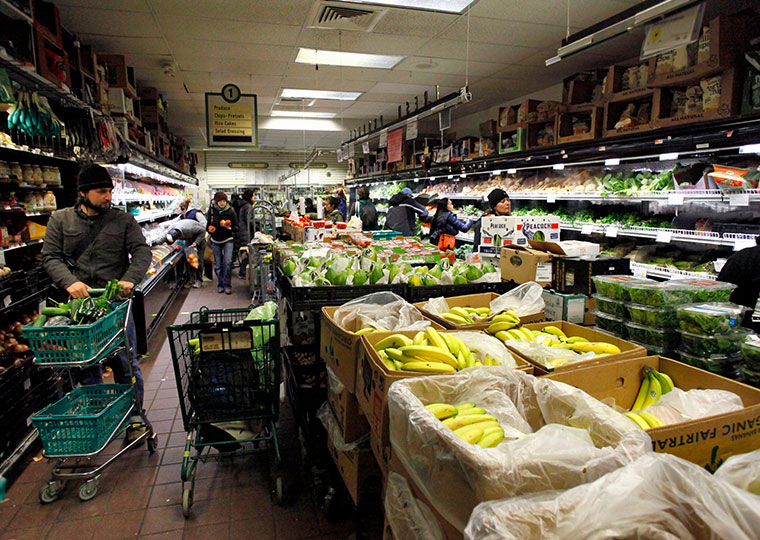Companies that report emissions appear greener only in a narrow measure
Urged on by governments, activists and investors, more companies are choosing to open up about their greenhouse-gas emissions. But those voluntary efforts have a critical blind spot: supply chains.
Most disclosing companies provide details about only the pollution that comes from their direct operations. But these Scope 1 emissions represent only a fraction of the total generated throughout a product’s life cycle, from raw-material production to end users. This broader category, known as Scope 3, is much harder to measure and rarely reported.
Opt In to the Review Monthly Email Update.
Disclosing Scope 1 emissions without reporting Scope 3 emissions can also help companies appear greener than they really are, suggests a working paper from Chinese University of Hong Kong’s Yilin Shi and Jing Wu and UCLA Anderson’s Christopher S. Tang. Analyzing the reported and estimated emissions of more than 13,000 companies, the study indicates that those reporting emissions data have lower Scope 1 emissions than those that don’t. But after adding emissions from suppliers, disclosing companies produce more total emissions than nondisclosing ones.
Pollution Disclosures Can Be Deceiving
This, the authors say, suggests that the companies voluntarily disclosing have, intentionally or not, shifted a large share of emissions upstream to suppliers whose operations may be less efficient. “Unless firms voluntarily disclose all kinds of emissions,” they write, “disclosing Scope 1 emissions alone can be misleading at best and greenwashing at worst.”
The number of companies volunteering information about emissions has soared over the past two decades. More than 4,000 public companies reported such data in 2020 compared with only 150 in 2002, according to S&P Global Trucost, which collects and analyzes company disclosure information from a variety of sources.
Regulators in the U.S. and the European Union recognize they aren’t getting the full picture. Early last year, the U.S. Securities and Exchange Commission proposed a far-reaching rule to require publicly traded companies to report direct Scope 1 emissions and, if they have a material effect on finances, Scope 3 emissions as well. The rule is supported by investors and asset managers, who see the information as vital for understanding the financial risks posed by climate change, but it has received pushback from industry and its allies. A revised version is expected to be released later this year.
Greenhouse-gas emissions fall into three tiers:
- Scope 1 measures the direct emissions from a company’s operations, such as from the gasoline burned by a corporate fleet or the energy used by a brewery to make beer.
- Scope 2 includes indirect emissions from the electricity or other energy purchased by a company.
- Scope 3 includes downstream emissions from shipping products to retailers or consumers and upstream emissions generated by a company’s various tiers of suppliers.
In their study, the authors focus on Scope 1 and upstream Scope 3 emissions, which fall under a company’s direct or — in the case of suppliers — indirect control. (Companies can, in theory, influence the environmental practices of their suppliers or choose to work with greener ones.)
Using data from Trucost, the authors examine disclosed or estimated emissions for more than 13,000 companies in 90 countries between 2002 and 2020. Only about a third of the companies voluntarily release information about Scope 1 emissions, so Trucost uses a model for calculating potential environmental impacts to estimate emissions from both undisclosed Scope 1 and all Scope 3 emissions.
The researchers’ analysis suggests that disclosing companies have nearly 40% lower Scope 1 than companies that don’t disclose, even after taking into account possible differences in the types of companies that disclose or potential weaknesses in Trucost’s estimation methods.
At the same time, disclosing companies’ estimated Scope 3 emissions are almost 4% higher than those of nondisclosing companies. Also, when Scope 1 and estimated Scope 3 emissions are added, the total is higher than the estimated total of emissions from companies that don’t provide the information.
That a small percentage difference in Scope 3 emissions — 4% — could more than wipe out a 40% difference in estimated Scope 1 emissions suggests the upstream part of the supply chain is far more carbon-intensive and thus merits more, not less, attention.
Shifting the Burden on Emissions
Companies can cut CO2 emissions through the use of technology or by making operations more efficient. The analysis suggests that many take a third path: outsourcing pollution-producing activities to suppliers.
Reasons for the difference aren’t obvious from the data. A company seeking greater efficiencies could outsource work to suppliers that are less efficient, resulting in higher Scope 3 emissions. Or it could intentionally transfer polluting activities up the supply chain to make its own operations appear greener.
The paper’s observations are consistent with other trends. Industrial carbon emissions in the U.S. have been declining over the last two decades but have been rising rapidly in still developing countries like China and India. Indeed, wealthy countries consume more CO2 in the form of products they purchase than they emit, which suggests that imported goods represent a lot of greenhouse-gas emissions that might otherwise have been generated by onshore manufacturers.
The analysis also indicates intriguing regional differences. Companies in North America and the Asia-Pacific region show lower Scope 1 but higher Scope 3 emissions, while those with European headquarters show a decline in Scope 1 emissions but no rise in Scope 3 or total emissions.
“Firms in North America and Asia have limited consciousness as they only care about the disclosed environmental image rather than the actual carbon footprint hidden in complex supply chains,” the authors write. “Such limited consciousness could provide the motivation for greenwashing behavior.”
Featured Faculty
-
Christopher Tang
UCLA Distinguished Professor; Edward W. Carter Chair in Business Administration; Senior Associate Dean, Global Initiatives; Faculty Director, Center for Global Management
About the Research
Shi, Y., Tang, C. S., and Wu, J. (2023). Are Firms Voluntarily Disclosing Emissions Greener? Available at SSRN 4426612.







